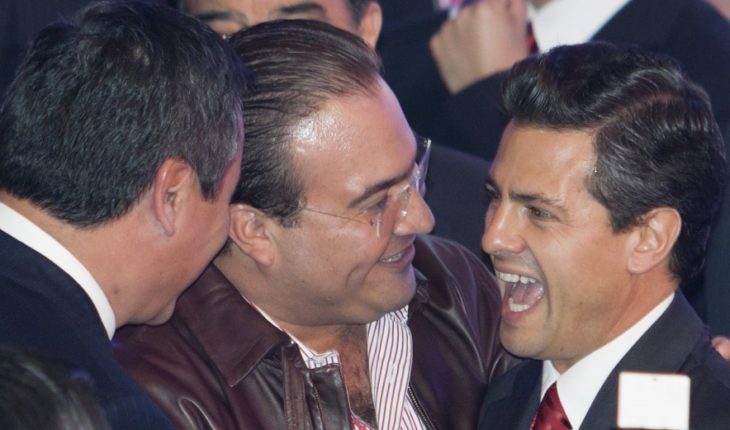According to investigations and statements held by the Attorney General’s Office of the Republic (FGR), Brazilian construction company Odebrecht allegedly injected in 2010 at least $850,000 into the campaigns of two first-time candidates for governor: Javier Duarte and Rodolfo Torre Cantú, a situation that ultimately allowed him to obtain contracts in Veracruz and Tamaulipas.
Versions of these payments had already transcended in recent years, but are now relevant because the FGR took them back through the statements of former Odebrecht executives, and included them in the documents it sent to a federal judge to apply for the order of apprehension against former Pemex director Emilio Lozoya Austin.
Although the Prosecutor’s Office has not formally accused Duarte of this case (Torre Cantú was killed shortly before the vote), the Public Prosecutor’s Office decided to include such signals to strengthen the hypothesis of his case against Lozoya, as he allegedly would have it was this one who proposed these “investments” to the company.
But how was this proposal made, and how did these payments be made? Who authorized them and who were the intermediaries? The following is the information contained in the file sent to the judge, to which Political Animal had access:
Investing in the future?
As narrated by the FGR to the federal judge, the interest of the construction company Odebrecht in investing in Mexico arose in 2009, when its then Director Superintendent in Mexico, Luis Alberto de Menesses Weyll, met Emilio Lozoya Austin, who at the time then he was Director of the World Economic Forum in Latin America.
“As a member of that position and as a Mexican, (Lozoya) had knowledge that Luis Weyll considered useful for his action plan. From 2009 to 2012 they had countless meetings whenever Emilio (Lozoya) was in Mexico, where he (Weyll) consulted him to guide him on how they could develop business,” prosecutors noted.
Lozoya’s specific recommendation for Weyll, as described by the FGR, was to partner with state-level entrepreneurs to strengthen their presence in the country, and specifically would have advised him to head to Veracruz and Tamaulipas, entities that by 2010 were under priist administration and with the possibility of repeating six-time.
Prosecutors contend that it was Lozoya himself who personally presented Odebrecht’s executives with several people in order to associate. This allowed the construction company to win various contracts in partnership with local companies.
As a “thank you” to the local efforts that helped Odebrecht position itself in Mexico, but also as an incentive to be favored with contracts at the federal level in the incoming government of Enrique Peña Nieto, Odebrecht transferred in 2012 more than three million dollars to Lozoya. Payment was made in five parts through facade accounts, as described in this note.
‘Batman’ and the half a million to Duarte
The file given to the judge details that Lozoya recommended to Odebrecht’s executives to invest in Veracruz, one of the most populous states in the country and with a strong infrastructure related to the production and transport of fuels, and its derivatives .
Specifically he recommended that they seek to partner with a local businessman named Felipe Ruz who, along with his son, owned the company “Russian Builder”, through which they could seek different investments.
However, according to FGR prosecutors, Lozoya’s recommendations were not limited to business alliances, but suggested that it was important to take advantage of the local political context of change of government.
“It should be noted that in July 2010 there would be state elections and that then-governor Fidel Herrera would be responsible for appointing Javier Duarte de Ochoa as his successor. For this reason, the Odebrecht company, in order to obtain a good position in the future government, contributed to the campaign of Javier Duarte de Ochoa the amount of 500 thousand American dollars”, indicates the document given to the judge.
This payment would have been authorized directly by Luiz Antonio Mameri, then Odebrecht’s then regional director for Latin America, and the transfer would have been made through the so-called Structured Operations Division, as it was called formally to the Bribe Payment Department of the Brazilian company.
It is detailed that these specific payments were catalogued under the code names “Batman and Robin”, within the system built by Odebrecht to track these “Drousys” named payments.
What the FGR does not detail is exactly which company or intermediary related to Javier Duarte’s campaign had transferred that government.
“As a result of these payments in mid-2013, the Government of Veracruz directly awarded the Company Constructora Norberto Odebrecht the Multiple Purposes Project in Xalapa, and the Russian Construction company was subcontracted for this work”, prosecutors indicated.
It should be noted that former officials close to Javier Duarte’s government have previously pointed out that Political Animal that there were illegal payments from Odebrecht in Veracruz, especially to win contracts related to water management. Yet the former governor has already refuted before that is true.
The 350 thousand to Torre Cantú
FGR prosecutors pointed out to the judge that “following the guidelines indicated by Emilio Lozoya” Odebrecht decided to intervene also in Tamaulipas, and for this he recommended Meneses Weyll to meet with Jorge Eduardo Rivera Schotte, tamaulipeco businessman shareholder of the company “Petrochem Mexico”.
Prosecutors detail that Rivera Schotte was part of a business circle that supported the then PRI candidate for the state government of Rodolfo Torre Cantú. According to the narrative, Rivera told Weyll that if he wanted to position himself in the entity he “needed to contribute to the campaign” of the aforementioned candidate.
“That is why Odebrecht made a payment of US$350,000 in the first half year of 2010, following the same mechanics as in the State of Veracruz, i.e. the payment was authorized directly by Luiz Mameri and made through the Operations Department Structured in the company,” the prosecutors said.
In this case it is added that the transfer was made to an account of Banco Mercantil del Norte, in the name of the company Blunderbuss Company of Mexico.
Blunderbuss is a company incorporated in 2008 in the city of Poza Rica, Veracruz, which in the social object of its charter (of which Political Animal has a copy) says he’s going to devote himself to multiple things, from construction to trade. The SAT has already labeled it this year as a so-atsumpy ghost company.
The Mexican organization Against Corruption and Impunity published – in this note – that the company is linked to a network of front companies that has channeled millions of dollars in bribes from Odebrecht.
What is not detailed in the file sent to the judge is what type of contract or investment the Brazilian construction company would have won in Tamaulipas, for the thousands of dollars it allegedly injected into the Cantú campaign.
Hidalgo investments
In the offices given to the judge, prosecutors contend that the construction company made the necessary connections – again with Lozoya’s alleged help – to invest in the state of Hidalgo, although no specific electoral or bribe payments are detailed here.
“Emilio Lozoya Austin recommended that Luis Weyll partner with businessman Juan Carlos Tapia Vargas, shareholder of Construcciones Industriales Tapia, who had a large presence and political influence in the state of Hidalgo and mainly with trade unions, which, in his words, in Mexico were of great relevance to win and execute projects.”
It is added that between 2011 and 2012 Odebrecht formed an alliance with the local company Construcciones industriales Tapia, to win contracts for various works.
If such local contracts were true, they would have occurred during the tenure of governors Miguel Angel Osorio Chong and Francisco Olvera Ruiz, both of priist extraction
According to prosecutors, these business partnerships ultimately helped Odebrecht strengthen its position in the search for federal contracts, such as those of Pemex around the Tula refinery in Hidalgo.
What we do in Animal Político requires professional journalists, teamwork, dialogue with readers and something very important: independence. You can help us keep going. Be part of the team.
Subscribe to Animal Politician, receive benefits and support free journalism.#YoSoyAnimal
translated from Spanish: Such were Odebrecht’s alleged payments to Javier Duarte
August 26, 2019 |





